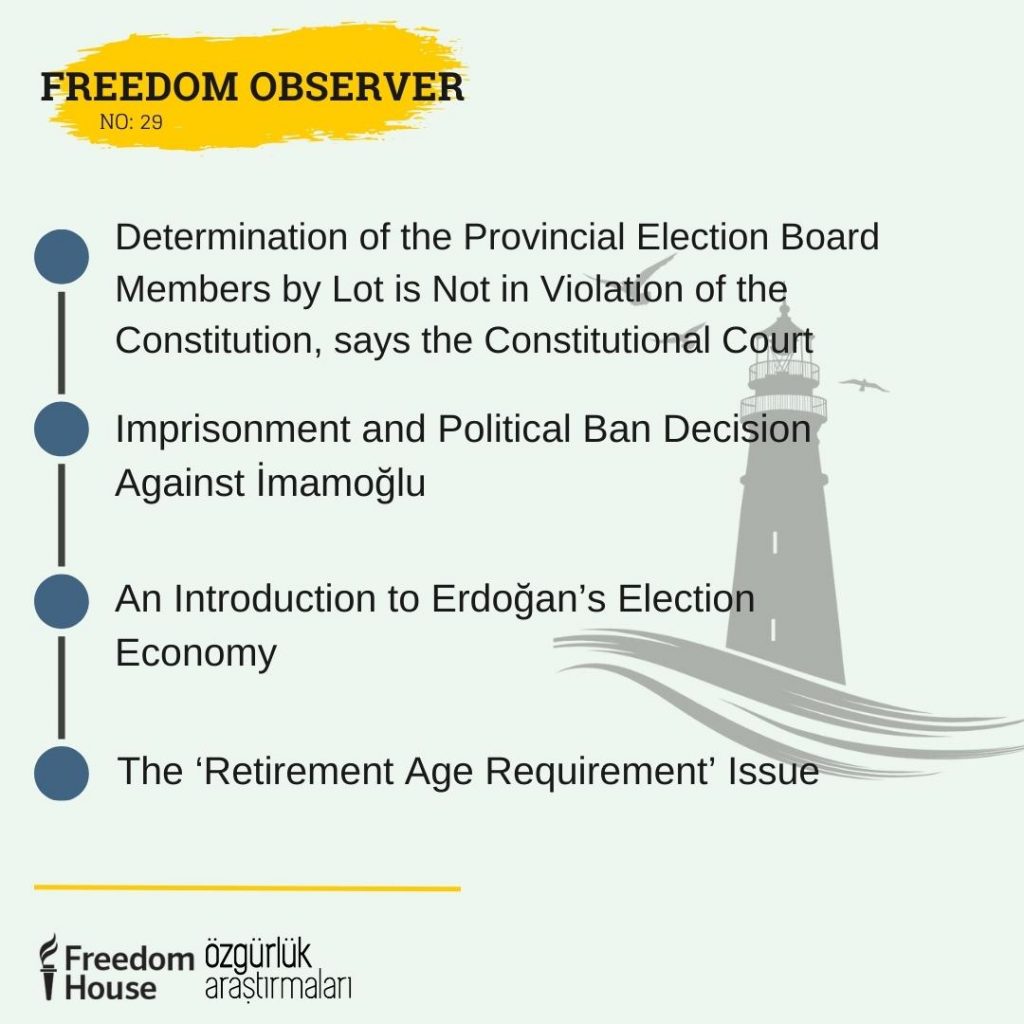
From Editor-in-Chief
The multi-faceted crisis that Turkey has been going through for the last ten years continues to deepen day by day and shows no signs of slowing down. Meanwhile, as the date of the legislative and presidential elections approached, politics has become intensified. On the one hand, the rivalry between the ruling bloc (AKP-MHP) and the “Table for Six”, which leads the opposition, continues in a way that challenges the rules of political courtesy and honesty due to the destructive steps taken by the government. On the other hand, the campaign that aims to shut down the Peoples’ Democracy Party, The, which was understood to be an official state project, unfortunately seems to yield intended results with the contribution of the Constitutional Court.
As a matter of fact, on January 5, 2023, the Constitutional Court decided to block the bank account where the treasury aid expected to be paid to HDP. However, constitutionally the Party can only be deprived of treasury aid only if it is definitively revealed at the end of the trial process that it is the focus of unconstitutional acts. Therefore, this interim decision for the Court means “enjoyment of opinion”.
On the other hand, since “deprivation of treasury aid” is a decision that can only be given as a final verdict, making a so-called “precautionary measure” decision that will have the same result emerges as a clear violation of the constitution and law. In fact, some other members of the Constitutional Court and the President, who is known to have liberal tendencies, did not agree with this decision.
Meanwhile, a recent decision on election legislation has created the impression that a majority that is concerned about acting in harmony with the political power is dominant in the Constitutional Court. Along with this decision at the end of last September, the Court approved the legal arrangement that envisaged to change the structure of the election boards and terminate the duties of the members of the board with the qualifications of judges before the end of their normal terms. Indeed, the decision of the Court could only mean that it approved the intervention of the political power in the election boards at a time when the general elections were approaching.
In fact, this is not the first move of the AKP-MHP ruling bloc to put the opposition in a hot water en route to the general elections. The court decision regarding the questionable criminal conviction and ban from public service against Ekrem İmamoğlu, the mayor of the Istanbul Metropolitan Municipality, was evidently motivated by the political power’s policy towards the “Table of Six”, which contradicted the understanding of fair and democratic competition.
Meanwhile, the so-called Constitutional amendment proposal brought on the agenda by the AKP-MHP ruling bloc to free headscarves, which is obviously designed as a trap for the opposition, is waiting for its turn to be introduced to the political arena.
Another policy that the political power has been following for a while is to take an advantageous position against the opposition by applying “election economy”. The legal regulation regarding the “Retirement Age Requirement” (EYT), which allows those to retire at a very young age (28-43), is a clear indicator of the electoral economy of the AKP-MHP ruling bloc. This regulation, which will benefit more than two million people, is a move that could seriously damage Turkey’s already poor pension system. In the coming weeks, we may encounter new examples of such populist gestures by the political power.
Finally, it is necessary to point out a development that can bring some hope to this pessimistic environment. The “Human Rights Action Plan”, announced by Ali Babacan, the chairman of the DEVA Party, made a promise to remove the ethnic-cultural reference in the definition of citizenship through the Constitutional amendment and to ensure that citizens whose mother tongue is not Turkish will receive education in their own language. We hope that this will be a stimulus to encourage the inclusion of more fundamental goals that go beyond the change of the government system in the vision of constitutional change of the “Table of Six”.
Hoping to see more good news in the next Bulletin.
Determination of the Provincial Election Board Members by Lot is Not in Violation of the Constitution, says the Constitutional Court
The government has made changes in various electoral laws, in particular with the Law on Elections of Parliament through the Law No. 7393 on Amendment of Certain Laws dated on 31/3/2022.[1] With these changes made before the General Elections for the Parliament and the Presidential Elections to be held in 2023, important changes were made in some laws, especially the Law No. 298 on Basic Provisions of Elections and Electoral Registers. One of the most important of these changes is the one regarding the formation of the Provincial Election Boards and the election of the District Election Board presidents. Accordingly, the principle of determining the members of the election board, previously determined on the basis of seniority, by drawing lots has been accepted. On the other hand, changes were made such as lowering the election threshold to 7%, taking the votes of the parties rather than the votes of the alliance as the basis in the distribution of deputies, accepting the application of election bans for the Ministers, and excluding the President from the scope of the bans.
An action for annulment was filed by the deputies of the main opposition party on the grounds that some articles of the said law were unconstitutional. In the request for annulment, it was stated that the new rules stipulating the fact that members of the Provincial Election Board and the chairmen of the District Election Board should be determined by drawing lots instead of seniority were not enacted for the sake of public interest. It is stated that new rules aim to ensure that new judges appointed after 2016 take part in the boards, thus prioritizing the ruling party’s interests. In addition, it has been argued that due to the fact that the election law is technical and complex, the judges who will take part in the boards should be composed of judges experienced in the field of election law, which is of vital importance for both the independence of the boards and the fair resolution of election disputes. Moreover, it was emphasized that why there was a need to change the rules, which had been implemented without any problems for 70 years and not encountered any problems. In the meantime, it has been argued that it is not clear whether the judges who will participate in the lot are all judges who meet the conditions specified in the law and who work in the province, or whether they include the bidders. For this reason, the opposition claims that the new rules are contrary to the Preamble and Articles 2, 5, 36, 67, 79 and 138 of the Constitution.
The Constitutional Court examined the regulation in terms of Articles 2, 67 and 79 of the Constitution and decided that the said rules were not unconstitutional.[2] According to the Constitutional Court, the legislature has judicial discretion in this area, as there is no provision in the Constitution on how election boards are to be formed. Therefore, the said rules are not in violation of the Constitution. Moreover, according to the Court, since the election boards do not have any organic ties with the legislative or executive organs, and the fact that they do not receive orders or instructions from them, the constitutional principle that elections to be held under judicial control cannot be violated. Stating that it is not a problem for the judges to be inexperienced, the Court emphasized that there are sufficient trained personnel in the election directorates.
According to the Constitutional Court, the provisional Article 24 added to the Law No. 298, which terminated the duties of all members of the board elected in January 2022 to serve for two years on the basis of seniority, and stipulates that those new elections to be held within three months by lottery procedure (with the 12th article of Law No. 7393) was unanimously decided that it was not contrary to the Constitution. Stating that the rule in question is not an “election law” within the meaning of Article 67 of the Constitution, the Court further stated that “there is no constitutional obstacle to the formation of electoral boards in a structure that does not include an element of the judiciary” (§ 127). Stating that the rule in question aims to ensure uniformity in the formation of election boards, the Court has determined that there is no purpose other than the purpose of public interest and has concluded that there is no interference with the impartiality and independence of the boards. Thus, the Court has declared that the government’s intervention in the election boards is not unconstitutional.
Imprisonment and Political Ban Decision Against İmamoğlu
The case against Istanbul Metropolitan Municipality Mayor Ekrem İmamoğlu for allegedly insulting Turkish High Election Board (YSK) members has been decided. In the decision of the Istanbul 7th Criminal Court of First Instance dated 14 December 2022, İBB Mayor Ekrem İmamoğlu was sentenced to 2 years 7 months and 15 days in prison for insulting the members of the YSK, and a political ban from public activities was imposed on him. Later, in the reasoned decision announced on December 28, the court stated that İmamoğlu’s remark “fool” against the members of the YSK is an act considered as a crime under Article 125 of the Turkish Penal Code ,and that İmamoğlu also committed the crime of insult in front of the press in an aggressive manner and offended the members of the high judiciary. It should be noted that if this decision is approved by the Court of Appeal and the Supreme Court, it will become final.
This decision met with a great reaction from different segments of the society, especially the opposition parties. On the day the decision was made, İmamoğlu, İYİ Party Chairman Meral Akşener and the vice presidents of other opposition parties held a rally in front of Saraçhane to protest the decision. The next day, the leader of the 6 opposition parties organized a rally under the banner of “The nation stands by their will”. They emphasized that the decision is highly political and that they stand with İmamoğlu.
First of all, it should be noted that this decision was made through political motives. Since the March 2019 local elections, the government has been trying to narrow down İmamoğlu’s field of activity, both as a mayor and as a political figure, through the courts and administrative methods. Behind the pressure exerted by the AKP government lies the rising political visibility of İmamoğlu after he won the İBB Presidency and the opposition’s possible presidential candidate in the elections scheduled for June 2023. As it has tried many times before, the AKP government seems to have based its main winning strategy before the 2023 elections on suppressing the opposition on many axes and encouraging them to align in its own direction through various methods.
It is not acceptable in liberal democracies that the government changes the rules in order not to lose the elections or puts pressure on the courts to exclude their opponents from the game. Instead of confronting with its opponents in public debates and elections, the government’s illegal and anti-democratic ways of suppressing the opposition not only seizes the rights of the politician in question, but also restricts our freedom of choice as citizens. One of the necessary conditions for holding the elections on a fair ground and not questioning the legitimacy of the election results is possible if the parties and politicians are exempt from such pressures. However, the AKP government casts a shadow over the legitimacy of an election and harms Turkish democracy in the long run.
An Introduction to Erdoğan’s Election Economy
The economic steps taken by governments in competitive authoritarian regimes have only one goal: to win elections. It is not surprising that this is the only goal in any system that does not depend on certain set of rules, foresight, and long-term interests. Although the problems that we will scrutinize below overturn the free market rules, such populist practices will lead to only short-term increase in the welfare of Turkish citizens in the current economic environment. However, the fact that all these moves, which temporarily increase the welfare of citizens, come before the elections show us that they are only aimed at creating an electoral economy.
Populist moves will result in a permanent deterioration in the budget balance and an increase in foreign debt interest rates in order to meet the short-term welfare increase of citizens. In addition, the efforts to provide resources for all these populist economic moves are not only disrupting the labor market but also the job market, and the foreign investment figures that Turkey needs lag far behind expectations.
The implementation of populist economic moves is almost the golden rule in competitive authoritarian regimes. However, how these moves will change the voting behavior is not as such as strict one. In other words, although the changes in economic voting behavior require economic reasons, it should be considered that the result may be different from the one envisaged by the government. On the other hand, however different it may be for the political power, the result does not change in terms of citizens’ long-term economic interests. The only result to be obtained from populist economic policies is backsliding on democracy and economic collapse.
Erdogan’s electoral economy practices are numerous and varied. For this reason, we will refer to this subject frequently in future bulletins. These illiberal economic moves may even form part of our newsletter. Since this is an introductory part, it will suffice to mention the most basic move below.
The ‘Retirement Age Requirement’ Issue
Along with the change of retirement conditions after the legal change on September 8, 1999, the retirement age requirement (EYT) had been on the political agenda for a long time. Political leaders from all parties were making statements on the issue especially at election times. Most prominently, President Erdoğan was claiming that “Even if I lose the election, I will not pass the early retirement law”. Yet, for those who are familiar with Erdoğan’s erratic U-turns in many cases, due to the decline in vote rates, the President later brought this law to the parliament’s agenda by presenting it as great good news.
Before the law in 1999, people who would only work for 20-25 years (20 for women, 25 for men) and retire could only to do so between the ages of 55-65 with a gradual retirement age application after this date. But for a long time, they have made the government lift the age restriction for them by establishing associations and doing social media activities. Yet, this opened the door to a new debate. As of September 9, 1999, people who started to work as registered with the Social Security Institution (SGK) will retire at the age of 55-60, while those who started work the day before, on September 8, will be able to retire at the age of 38-43 and receive a pension. This will appear again in the future as an imbalance that disrupts the work peace.
Indeed, the only imbalance that has been created has not been in earning pension entitlements. In countries such as Turkey, where the social security system is not managed properly, the employee-retired balance constitutes a serious contestation. In a standard, normal, ordinary pension system, the employee pays the system, a fund is formed there, and the value collected in the fund gradually increases with the management of that fund. The fund reimburses people who are due to retire. That is, the fund evaluates the employee’s money. If there is a social aspect of the pension system here, some of the shares paid by the citizens working at that time are transferred to the people who are already retired. While this approach claims that the pension system in Turkey is also a social one, it is calculated that as a result of the situation created, there will be 1.4 to 1.6 employees per pensioner in Turkey. Normally, this number is expected to be at least 4 so that the pension system becomes sustainable. However, while Turkey’s pension system is already unsustainable, it will not take long for it to collapse completely after the new regulation.
References
1- https://www.resmigazete.gov.tr/eskiler/2022/04/20220406-1.htm
2- AYM, E.2022/50, K.2022/107, 28/09/2022 https://normkararlarbilgibankasi.anayasa.gov.tr/ND/2022/107
[1] https://www.resmigazete.gov.tr/eskiler/2022/04/20220406-1.htm
[2] AYM, E.2022/50, K.2022/107, 28/09/2022 accessible through https://normkararlarbilgibankasi.anayasa.gov.tr/ND/2022/107





